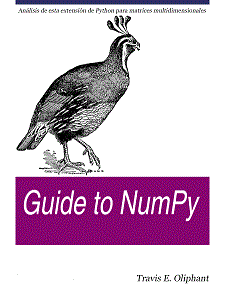
|
FreeComputerBooks.com
Links to Free Computer, Mathematics, Technical Books all over the World
|
|
- Title: Guide to NumPy
- Author(s) Travis E. Oliphant
- Publisher: Massachusetts Institute of Technology (Dec 7, 2006)
- License(s): Public Domain Mark 1.0
- Hardcover/Paperback: N/A
- eBook: HTML, PDF (371 pages), ePub, Kindle (Mobi), etc.
- Language: English
- ISBN-10: N/A
- ISBN-13: N/A
- Share This:

|
NumPy is an extension of Python, which provides highly optimized arrays and numerical operations. NumPy replaces a lot of the functionality of Matlab and Mathematica specifically vectorized operations, but in contrast to those products is free and open source. In today's world of science and technology, it is all about speed and flexibility.
This book is for programmers, scientists, or engineers, who have basic Python knowledge and would like to be able to do numerical computations with Python. It will give you a solid foundation in NumPy arrays and universal functions. Learning NumPy Array will help you be productive with NumPy and write clean and fast code.
- Improve the performance of calculations with clean and efficient NumPy code
- Analyze large data sets using statistical functions and execute complex linear algebra and mathematical computations
- Perform complex array operations in a simple manner
- Travis E. Oliphant is an American data scientist and businessman and a passionate advocate of open source technology, has a Ph.D. from Mayo Clinic and B.S. and M.S. degrees in Mathematics and Electrical Engineering from Brigham Young University. Since 1997, he has worked extensively with Python for numerical and scientific programming. He is the primary developer of the NumPy package and founding contributor to the SciPy package.

- Guide to NumPy (Travis E. Oliphant)
- The Mirror Site (1) - PDF
- NumPy Beginner's Guide: An Action Packed Guide Using Real World Examples
-
 From Python to NumPy (Nicolas P. Rougier)
From Python to NumPy (Nicolas P. Rougier)
NumPy is one of the most important scientific computing libraries available for Python. This book teaches you how to achieve expert level competency to perform complex operations, with in-depth coverage of advanced concepts.
-
 NumPy Tutorials (Usman Malik, Anne Bonner, et al)
NumPy Tutorials (Usman Malik, Anne Bonner, et al)
They provide everything you need to know to get started with NumPy. They also explain the basics of NumPy such as its architecture and environment, discusses the various array functions, types of indexing, etc. With examples for better understanding.
-
 Programming for Computations - Python 3 Edition
Programming for Computations - Python 3 Edition
This book outlines the shortest possible path from no previous experience with programming to a set of skills that allows students to write simple programs for solving common mathematical problems with numerical methods in the context.
-
 Scipy Lecture Notes (Emmanuelle Gouillart, et al)
Scipy Lecture Notes (Emmanuelle Gouillart, et al)
This book teaches the scientific Python ecosystem, a quick introduction to central tools and techniques. It is for programmers from beginner to expert. Work on real-world problems with SciPy, NumPy, Pandas, scikit-image, and other Python libraries.
-
 SciPy Programming Succinctly (James McCaffrey)
SciPy Programming Succinctly (James McCaffrey)
This book offers readers a quick, thorough grounding in knowledge of the Python open source extension SciPy. The SciPy library, accompanied by its interdependent NumPy, offers Python programmers advanced functions that work with arrays and matrices.
-
 Computational Physics with Python (Eric Ayars)
Computational Physics with Python (Eric Ayars)
This book provides an unusually broad survey of the topics of modern computational physics. Its philosophy is rooted in learning by doing, with new scientific materials as well as with the Python programming language.
-
 Solving PDEs in Python: The FEniCS Tutorial I (H. Langtangen)
Solving PDEs in Python: The FEniCS Tutorial I (H. Langtangen)
This book offers a concise and gentle introduction to finite element programming in Python based on the popular FEniCS software library. Using a series of examples, it guides readers through the essential steps to quickly solving a PDE in FEniCS.
-
 Python Scripting for Computational Science (Hans Langtangen)
Python Scripting for Computational Science (Hans Langtangen)
With a primary focus on examples and applications of relevance to computational scientists, this brilliantly useful book shows computational scientists how to develop tailored, flexible, and human-efficient working environments built from small scripts written in the easy-to-learn, high-level Python language.





